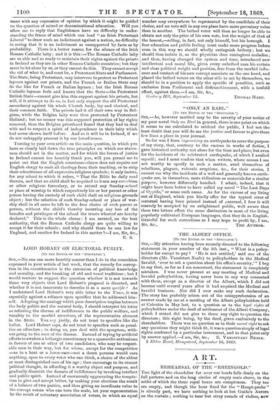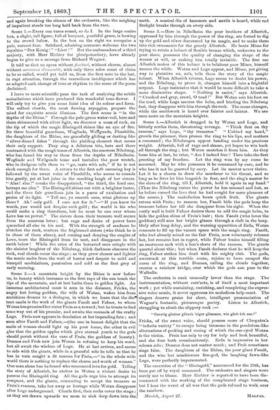ART.
REHEARSAL OF THE " RHEINGOLD."
THE light of the chandelier far over our heads falls dimly on the full parterre and on the long circles of empty seats above, in the midst of which the three royal boxes are conspicuous. They too are empty, and though the hour fixed' for the " Haupt-probe " is already past, we have nothing to look at but Guido's Aurora on the curtain ; nothing to hear but stray rounds of violins, sow
and again breaking the silence of the orchestra, like the neighing of impatient steeds too long held back from the race.
Scene 1.—Every one turns round, so do I. In the large centre box, a slight, tall figure, full of buoyant, youthful grace, is bowing to the crowd below. In the box on the right we recognize a pale, earnest face. Subdued, admiring murmurs welcome the two royalties "Der Konig ! " "Liszt !" But the ambassadors of a third majesty, with Herr Richter for plenipotentiary, have already begun to give us a message from Richard Wagner.
It told us that an opera without forituri, without chorus, almost without morceaux &ensemble, with only three solos scant of claim to be so called, would yet hold us, from the first note to the last, in rapt attention, through the marvellous intelligence which has so adapted each change of tone or rhythm to the sense of the poem declaimed.
I leave to more scientific pens the task of analyzing the subtle assimilations which have produced this wonderful tone-flower. I will only try to give you some faint idea of its colour and form. The softest chords, the most flowing arpeggios, prepare the mind for exquisite scenic illusions. The first scene is " in the depths of the Rhine." Through the pale-green water-veil, here and there shimmered with silver light, we discover a mass of rock, on the tip of which the magic Rheingold shines like an eye of fire. Its three beautiful guardians, Woglinde, Weilgunde, Flosshilda, the daughters of the Rhine, are gracefully gliding or darting like "silver-finned fishes" through the yielding element that seems their only support. They sing a delicious trio, here and there contrasted with the rough tones of Alberich, the amorous Nibelung, who has found his way to them from the depths of Nibelheim. Woglinde and Wellgunde tease and tantalize the poor wretch, who in dudgeon tells them to " go, mate with eels," if he is not sleek enough for them. A return to the first soft caressing key is followed by the sweet voice of Flosshilda, who seems to console him gently, yet at last joins in the mocking laugh of her sisters. "Alas! alas I" croaks the disappointed, " the third, the fond one, betrays me also." The Rheiugold shines out with a brighter lustre, and the three fair guardians join in a pas= of exultation and praise of its light. " Tell me, ye smooth ones, what glistens up there ? Ah ! only gold. I care not for it."—" If you knew its worth, you would not despise such gold ; the world is his who could make a ring therefrom, but he must be one over whom Love has no power." The sisters deem their treasure well secure from the amorous lover ; but rage and desire of power have quenched all else in his soul. With the strength of madness he clutches the rock, scatters the frightened sisters (who think he is in chase of them alone), and cursing and denying the empire of Love, tears the Rheingold from its nest, and disappears in the earth below ! While the cries of the bereaved ones mingle with the sinister laughter of the Nibelung, thick darkness obscures the rock, real clouds cover the stage ; as they grow clearer and lighter the music melts from the wail of horror and despair to mild and tranquil modulations, passionless and cold as the first grey of early morning.
Scene 2.—A mountain height by the Rhine is now before us, in beauty which increases as the first rays of the sun touch the tips of the mountain, and at last bathe them in golden light. An immense architectural mass is seen in the distance, Fricka, the angry but loving goddess, the wife of Wotan, wakes him from ambitious dreams to a dialogue, in which we learn that the dig!' taut castle is the work of the giants Fasolt and Fafner, to whom Wotan has promised her sister Freia as a reward ; but he trusts to find some way out of his promise, and awaits the counsels of the crafty Loge. Freia now appears in desolation at her impending fate ; and soon after Fasolt and Fafner,—(the one in honest delight that the smile of woman should light up his poor home, the other in evil glee that the golden apples which give eternal youth to the gods should perish without the care of Freia, the goddess of beauty). Donnes and Froh now join Wotan in refusing to keep his word, but all await the wisdom of Loge. He at last arrives, and seems to side with the giants, while in a graceful solo he tells us that he has in vain sought a fit ransom for Freia,—" in the whole wide world there is nothing to replace the charm and worth of woman." One man alone has he found who renounced love for gold. Telling the story of Alberich, he excites in 1Votan a violent desire to possess the Rheingold ring. All the gods urge him to attempt its conquest, and the giants, consenting to accept the treasure as Freia's ransom, take her away as hostage while Wotan disappears after Loge underground. Clouds first, then rocks cover the stage ; as they are drawn upwards we seem to sink deep down into the
earth. A musical din of hammers and anvils is heard, while red firelight breaks through on every side.
Scene 3.—Here in Nibelheim the poor brothers of Alberich, oppressed by him through the power of the ring, are forced to dig up the gold and silver discovered by its magic, and to make them into rich ornaments for the greedy Alberich. He beats Minis for trying to retain a helmet of flexible bronze which, unknown to the poor slave, possesses the quality of changing the shape of the wearer at will, or making him totally invisible. The first use Alberich makes of this helmet is to belabour poor Mime, himself unseen the while. Wotan and Loge appear, and Mime, yet giving way to plaintive au, au's, tells them the story of the magic helmet. When Alberich returns, Loge seems to doubt his power, and the Nibelung, to prove it, changes himself into a frightful serpent. Loge insinuates that it would be more difficult to take a more diminutive shape. "Nothing is easier," says Alberich. " Crooked and grey, crawl, 0 toad !" But Wotan sets his foot on the toad, while Loge secures the helm, and binding the Nibelung fast, they disappear with him through the rock. The scene changes, while the smithwork is heard ever fainter and fainter. We are once more on the mountain heights.
Scene 4.—Alberich is dragged in by Wotan and Loge, and bitterly reviles them, threatening revenge. "Think first on thy ransom," says Loge, "thy treasures." " Unbind my hand," growls the prisoner, then presses the ring to his lips, and mutters a command ; the Nibelungen appear bending under the precious weight. Alberich, full of rage and shame, yet hopes to win back all through the ring ; but Wotan snatches it from him. As they loose him at last, he cries, "Am I indeed free? Then take the first greeting of my freedom. Let the ring won by my curse be accursed. May he who possesses it be consumed by care, and he who has it not be gnawed by envy. Let its master never thrive. Let it be a charm to draw the murderer to his throat, and so long as he lives let him languish in fear, and the ring's master be the slave of the ring, till I, Alberich, hold it again in my hand." (Thus the Nibelung curses the power he has misused and lost, as he before cursed the love that he had sought for mere pleasure of the senses.) The malediction bears quick fruit. The giants return with Freia ; to ransom her, Fasolt bids the gods heap the treasure before her till she disappear from his sight. When the costly wall is built Fafner desires them to add the magic helm, to hide the golden shine of Freia's hair ; then Fasolt (who loves the goddess) still sees her bright glance through a cleft in the heap. Only after long delay, and the warning apparition of Erda, Wotan consents to fill up the vacant space with the magic ring. Fasolt, who had already seized on the fair Freia, now reluctantly releases her, but remains lost in regret, while Fafner busies himself filling an enormous sack with a lion's share of the ransom. The giants quarrel about this ; but when Fasolt declares that he will keep the ring, Fafner strikes him dead with his mighty club. The gods, awestruck at this terrible scene, rejoice to have escaped the curse of the ring, and Donnes, calling the clouds together, creates a rainbow bridge, over which the gods can pass to the Walhalla.
The orchestra is sunk unusually lower than the stage. The instrumentation, without entr'acte, is of itself a most important work ; yet while sustaining, enriching, and completing the expres- sive voice music, it never oppresses its melodious help-meet. The singers deserve praise for clear, intelligent pronunciation of Wagner's fantastic, picturesque poetry. Listen to Alberich, struggling to climb the slippery rock :—
" Garstig glatter glitech 'riger glimmer, wie gleit ich !"
Fricka, of the sweet voice, should possess more of Cleopatra's " infinite variety" to escape being tiresome in the pendulum-like alternations of pecking and cooing of which the one-eyed Wotan is the victim. Freia has only to cry for help and look beautiful, and she does both conscientiously. Erda is impressive in her solemn solo ; Donnes does not matter much ; and Froh sometimes sings false. The daughters of the Rhine, the poor giant Fasolt, and the wise but mischievous fire-god, the laughing fawn-like Loge, were perfectly impersonated.
The execution of the " Rheingold," announced for the 29th, has been put off by royal command. The orchestra and singers were surely not to blame. Herr Richter is reported to have been dis- contented with the working of the complicated stage business, but I hear the worst of all was that the gods refused to walk over the rainbow.































 Previous page
Previous page